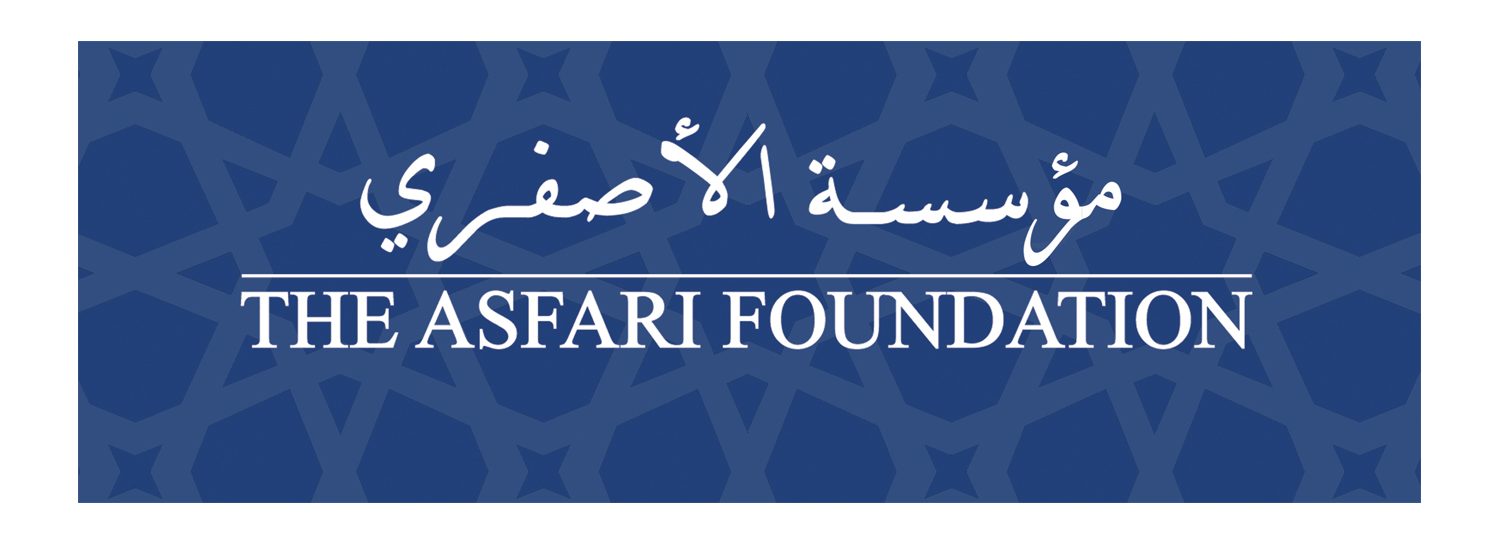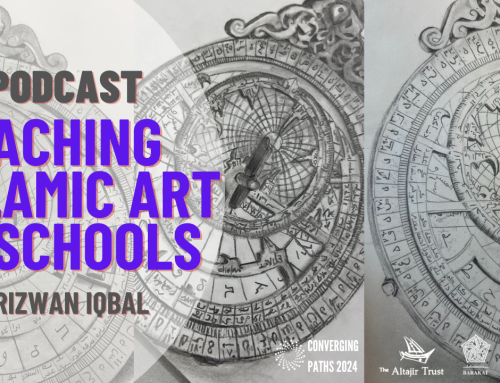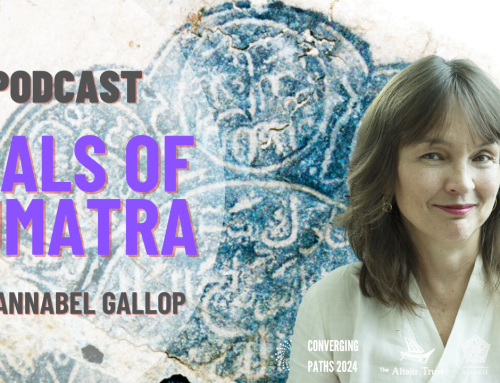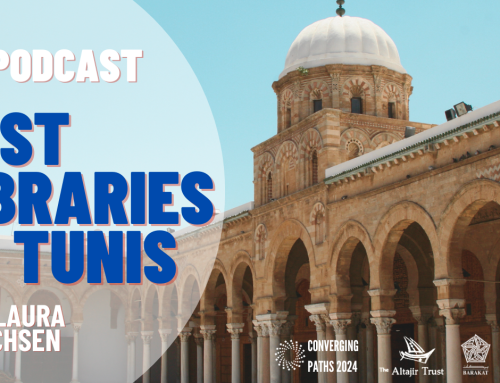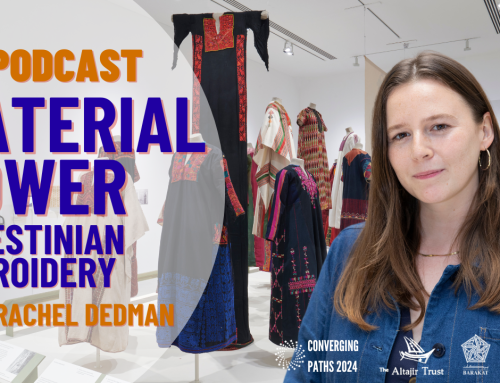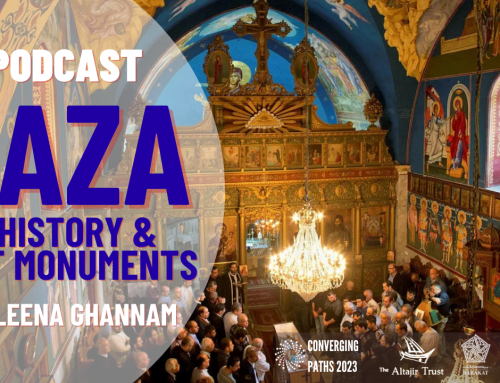In these times, being away from home may not just be a physical reality, but a psychological one, with many Syrians cut off from their land, friends and family. As a result, many have experienced an acute sense of homesickness and isolation. This raises big questions on identity, belonging and the idea of home. Yet, as adapting to life abroad is a bittersweet experience for many, the situation is also providing a unique opportunity for Syrians to reach out to British culture to understand it better, enrich it and build stronger intercultural bonds based on openness, humanity and mutuality.
Unfortunately, the mainstream media doesn’t help much, as it usually associates Syria with backwardness or conflict. It sometimes portrays Syrian immigrants as ‘different’ people who need sympathy, which can be patronising in some cases, or people to be feared, especially by anti-immigration media. However, we look at it from a human perspective, as people with immense strength and experience of coping with living away from a war-torn home, and adapting to a new home, with its differences and similarities. Although there is a lot of common ground with British culture, we see the difference as complementary rather than separating.
The main goal of the project is to explore the pattern of how Syrians are adapting to the situation. It will also aim to connect them together, by learning from each other, as well as addressing some misconceptions. This project is delivered by The Barakat Trust and funded by the Asfari Foundation.
Thanks to Seif el-Rashidi at The Barakat Trust for facilitating the project and making it possible, and thanks to Maria AliAdib and Shereen Daoud at the Asfari Foundation for the flexibility and patience. We also owe a note of thanks for Nikos Papasarantopoulos for helping in the photography of one of the interviews.
Download Report
Click on the link below, enter your email address to download the report.
Contents
01: A story of a health professional who worked in different war-torn countries and is currently living in London. Rita has a profound story of living in different places and adapting to life in London.
02: Tarek is working in a start-up company in Edinburgh as a microchip designer. He grew up in UAE and used to go to Suwayda in Syria almost every year. Tarek has an interesting insight on how Syria was for him and how he is adapting to living in his new home, as he describes it.
03: Riad is a medicine student at the University of St. Andrews. Coming originally from the seaside city of Tartus, Riad shares his story of how the sea reminds him of home and what it means to live in a small city.
04: As an International Relations student at Edinburgh University, Lilac reflects on her research on identity through her personal story living as a Syrian the UK.
05: Abed is an enthusiastic social worker currently living in Manchester. Abed did Post-war Recovery Studies with the aim of helping people in his country recover after the war is over. Abed has an insider knowledge of how the Arab community is integrating in the UK.
06: Nada is a software developer working in Glasgow. She lived in different places in the UK before she bought a home in Glasgow and settled with her husband. Nada has an interesting story of how she created a lifestyle that she wanted in the new city she is living in.
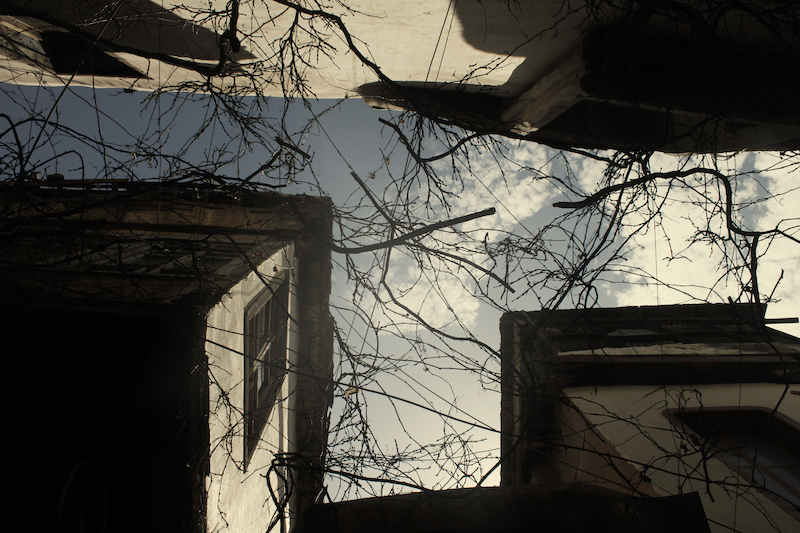
Roofview in the Old City of Damascus in 2010 © Waseem
Syria is a society with a long, diverse, cultural history. Importance is placed first on family and social relations. As a Mediterranean country, people are used to being around each other all the time and meeting in large social gatherings. This is reflected through architecture, customs and even making large cuisine meals.
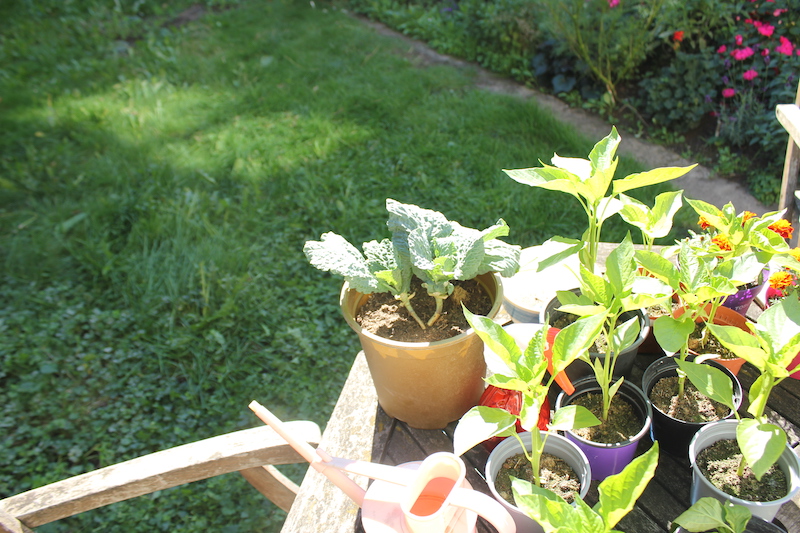
Rita’s Special plants in her garden © Waseem
01: Rita
Waseem: After talking to Rita about the idea for this project, she invited me to her house in East London for the interview. When I arrived at her place, she welcomed me with a typical Syrian gesture and offered a huge breakfast that she learned how to cook while she was working in South Sudan. She showed me to her garden, where we picked some herbs for a very relaxing cup of tea.
Rita was particularly thoughtfu and empathetic, and has had a special experience that is worth sharing with the world. The interview took more time than what we had anticipated, and I had to cut the conversation short to catch the train back to Scotland. Talking with Rita about her experience was very rewarding and eye opening.
LONDON
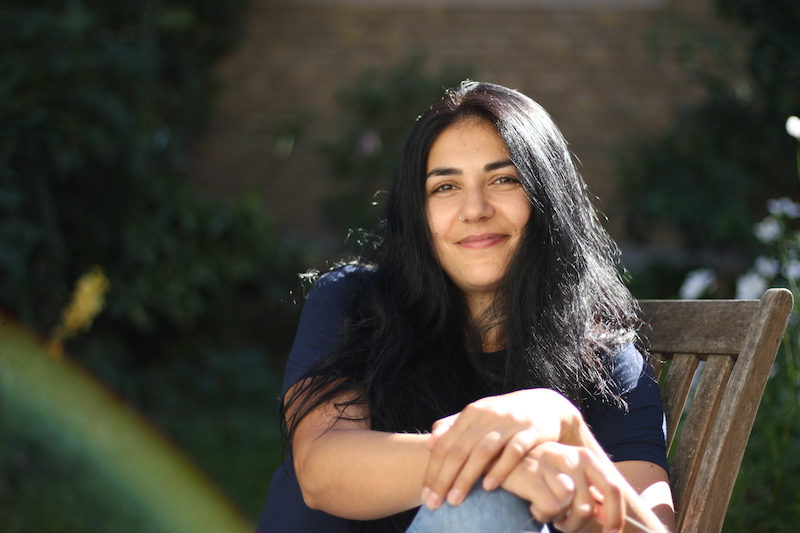
When I was in Syria I was working with the international Red Cross organisation and realised that I might need to undertake further education in order to learn to deal better with conflict-related situations in this field. So, I applied for a master’s in Public Health in the UK. I thought I knew about the place and the
people, but the reality was a bit different, especially after my
situation got more complicated.
I was arrested in Syria and after I was released, I was kidnapped by ISIS. My work with the Red Cross somehow protected me and they let me go. There were a lot of questions from the authorities that made me decide to stay in the UK. After finishing my master’s in King’s College London, I worked with the Red Cross in South Sudan and Zimbabwe. After that, I came back to Chatham House to do a fellowship that I finished last month.
Waseem: Tell me about your home in Syria? And what are you missing?
I miss my apartment in Jaramana, Damascus because to me this is the place where I had my first glimpse of personal independence; I liked myself back then. I got to furnish it and decorate it on my own. The place had special features like a traditional water pot and big glass windows that used to be quite cold in the winter. I also used to work and make my own money.
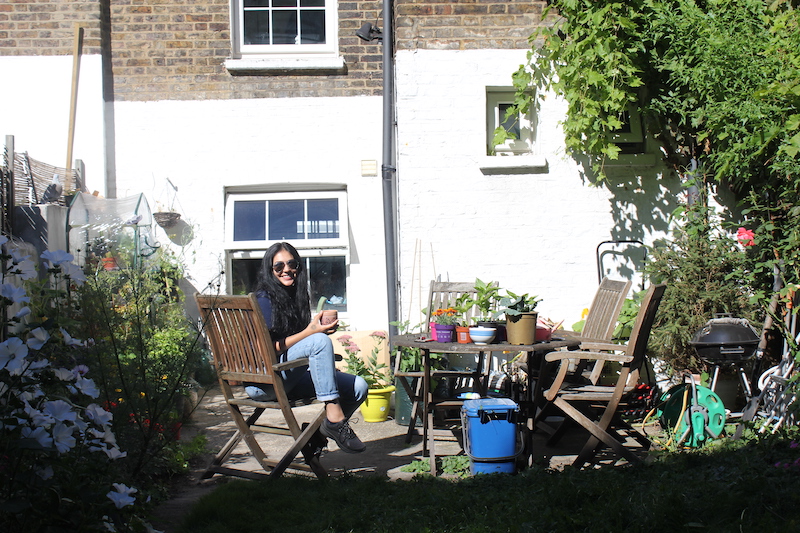
Rita’s Garden in her house in East London © Waseem
“Where I live now is the second place that feels like home – it has a garden where I can grow plants. My daily routine includes coffee and checking my flowers and plants in the morning. This makes me feel home and grounded. Another element that I like in the house is my south-facing room as the sun enters it. This somehow makes me feel home and reminds me of the Middle East.” ~ Rita
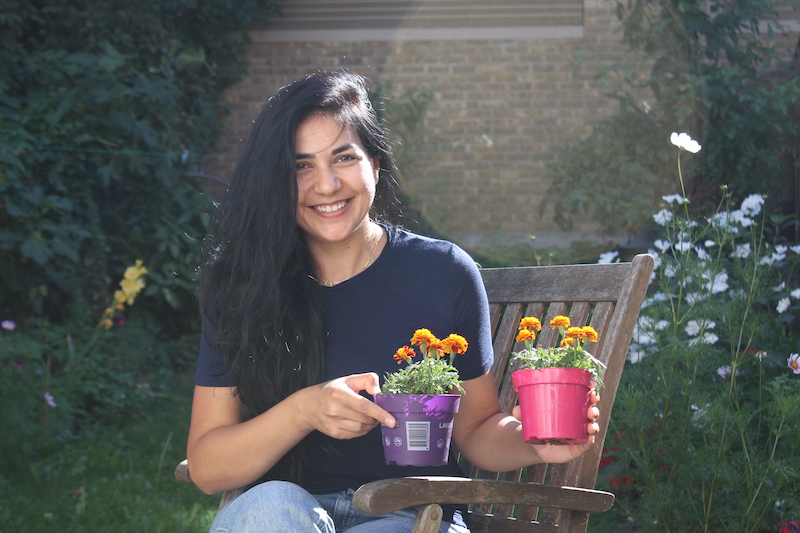
Rita © Waseem
Something that helped me to feel like I belong to the place and experience it differently is reading about its history. I saw a lot of similarities with the history of the Middle East and that we are just in different stages. The moment I knew more about the place that I live in, I felt closer to it. For example, when I was in Scotland, I read a lot about the Scottish Mythology and it made me fall in love with the culture and the place.
Another thing that helped me is volunteering with local communities that do organic farming in different places across the UK. I had to live with different families when I did that and started to notice the cultural differences and similarities and also the differences among the British social classes and communities that I didn’t understand before.
the two cultures, as I understand both well enough. I think this can happen through my intellectual and medical contributions in the research work that I do that would benefit the society as a whole.
Waseem: Any funny cultural differences?
I found that dating is very different here than it is in Syria, especially when it comes to expressing emotions. In Syria, people are very informal and very expressive. You know when someone likes you because they show it right away and when you like someone you can show it easily. I feel that having an emotional connection with somebody here needs breaking a lot of ice; this can be time and energy consuming. I find it complicated but very funny.
There is nothing as beatuiful as the shadows cast by gentle moving water.
Waseem: How could your experience and knowledge benefit the UK?
Dealing with being away from home started with accepting my situation. If you live in a reality that you don’t like or accept, you stop loving yourself. No one will like you if you don’t like yourself.
Beyond the tuition fees, the taxes and financial contributions, I represent a part of the Syrian society that is not very well known here: the groups that see Syria and the world in a different way. I feel like my experience could be an important connection between
Waseem: What is East London for you? and what do you like about it?
I can’t speak about my experience in the place I currently live without talking about my first experience in London in general. First, I lived by myself in the area of my university, which was perceived as a bit dangerous. It was great in a sense that it was close to everything central, but it was a bit pricey too. I felt that the place had no soul. Somehow my experience of living alone in Syria was different from this one. I thought they were going to be similar but in reality, I had a cultural shock and suffered from depression. For the first time, I had a difficulty making friends. I used to be a very well-known person in Syria, and I had friends and family around me who knew who I am. I felt as if I was no one here; nobody knew who I was and what I have done or achieved. Living by myself made me very lonely at the time. Then, I decided to leave London and promised to myself not to go back.
After a few years, I came back as I started to understand things differently. My conclusion was that, in order to live in this city, you should be strong, and you should know what you want. If you are lost, it makes you more lost and if you are sad, it makes you sadder. However, if you are strong, it makes you stronger. Somehow, it reflects you. At the time, I came with some savings to do an international fellowship in Chatham House. That made me have more confidence and get more validation of my experience in the new environment.
My conclusion was that, in order to live in this city, you should be strong, and you should know what you want. If you are lost, it makes you more lost and if you are sad, it makes you sadder. However, if you are strong, it makes you stronger.
At this time, I decided to live somewhere in London with people from many backgrounds; I cannot tolerate any kind of racism and I didn’t want to live somewhere posh as well. I found East London to be the best compromise for what I wanted. Where I live now is the second place that felt like home – it has a garden where I can grow plants. My daily routine includes coffee and checking my flowers and plants in the morning. This makes me feel home and grounded. Another element that I like in the house is my south-facing room as the sun enters it. This somehow makes me feel home and reminds me of the Middle East.
Waseem: What are the things that people don’t get about you?
I wish people could see the courage that I have, not the misfortune that I suffered. The courage to come here and build the life that I am building. The first reaction when people know that I am from Syria is either they feel sorry for me or ask me when I am planning to return. This depends on their political affiliation. I am proud of my courage in overcoming many hardships that many would find impossible to overcome. That was not easy but I managed to do it myself. I wish that people could see that.
Waseem: How do you deal with times of difficulty here?
Dealing with being away from home started with accepting my situation. If you live in a reality that you don’t like or accept, you stop loving yourself. No one will like you if you don’t like yourself.
Something that helped me to feel like I belong to the place and experience it differently is reading about its history. I saw a lot of similarities with the history of the Middle East and that we are just in different stages. The moment I knew more about the place that I live in, I felt closer to it. For example, when I was in Scotland, I read a lot about the Scottish Mythology and it made me fall in love with the culture and the place.
Another thing that helped me is volunteering with local communities that do organic farming in different places across the UK. I had to live with different families when I did that and started to notice the cultural differences and similarities and also the differences among the British social classes and communities that I didn’t understand before.
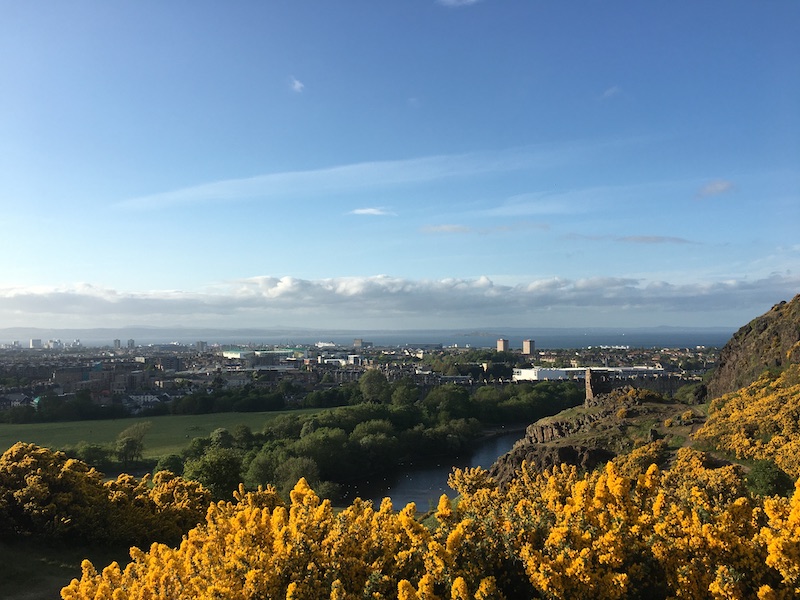
View of Edinburgh © Waseem
02: Tarek
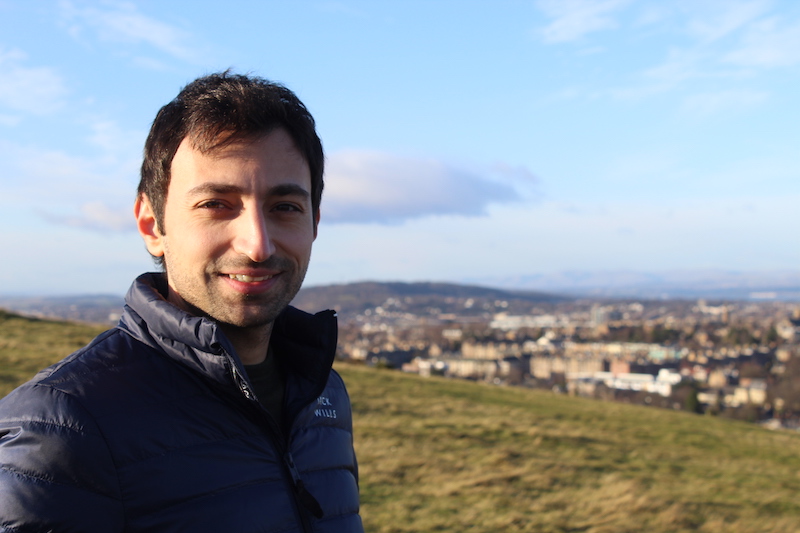
EDINBURGH
Sophia: When I arrived at the Costa Coffee café in Cameron Toll shopping centre and having already met Tarek two or three times in the past, I immediately started looking for him. With this being my first interview, I was a bit anxious of how it would go. After a thorough scan of the café I could not seem to find him, as it turned out he had chosen a table behind the counter with the noise of the coffee makers and the steamers obscuring every other noise. Tarek had probably chosen a secluded enough table for us to talk without being self-conscious about others listening, but yet again we had some laughs while trying to record our conversation. I also had some laughs when later on I tried to transcribe it.
We ordered some coffee and had a friendly chat about our current situation. Tarek is working in a start up company in Edinburgh as a micro-chip designer, to be honest I am not the one for STEM so did not really get the details. He finished his PhD and graduated last year. This excellent development made me almost shout out “that’s so exciting, you are a Doctor now” to which Tarek responded Yes, time flies by” in the most kind way possible. And we moved on with our chat. I asked him if he liked working for his company and Tarek responded that:
”It’s a new experience. It’s a start up so the atmosphere could get quite challenging. I think these kind of challenges put you out of your comfort zone. If you want to see the positive side!”
After reflecting for a bit on how many new experiences that put us out of our comfort zone both Tarek and I had over the past years, I asked if he enjoyed his PhD, since for most people is an emotional roller coaster, Takek said “I loved my PhD. I am sad that it’s over I swear!”, this took me by surprise but started to realise that this chat will be a banner for positivity and declared to Tarek “I am only going to hang out with you from now on.
I thought I’d explore that a bit more:
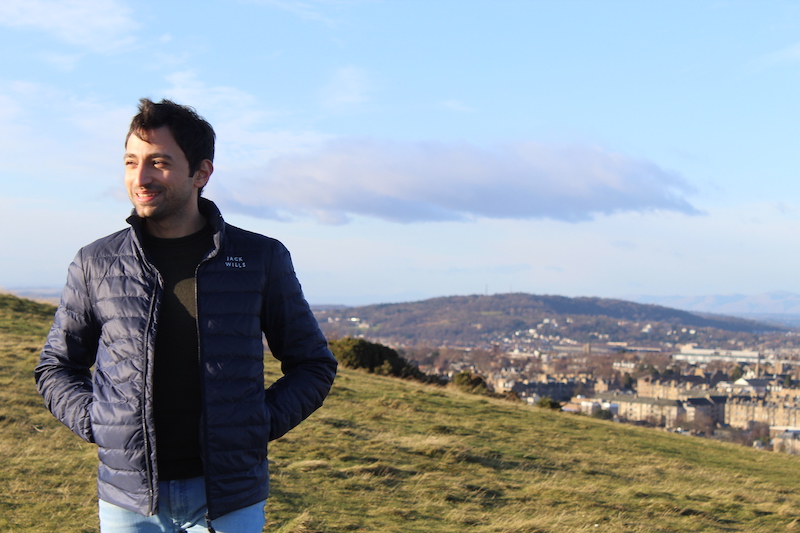
Tarek at Blackford Hill © Nikos
“Edinburgh specifically as a city it’s the place that changed my life. So I’ll always feel connected to the city first and then maybe to Scotland.” ~ Tarek
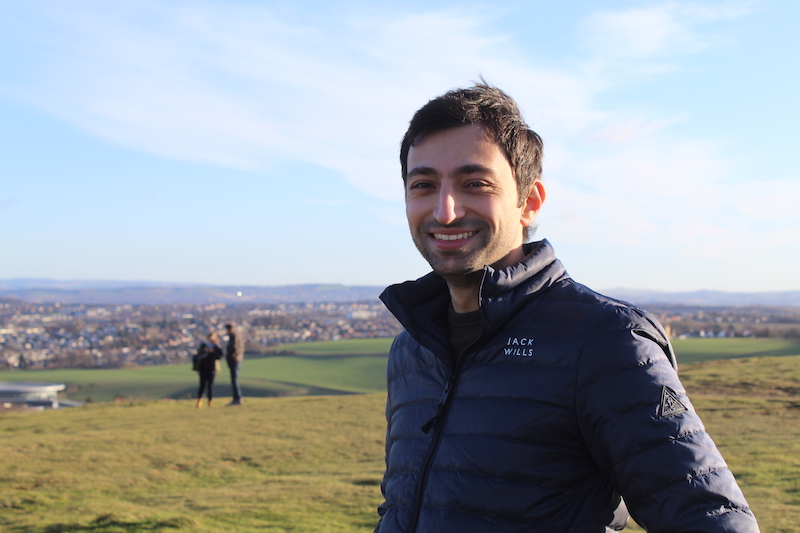
Tarek at Blackford Hill © Nikos
At this point of the interview, Tarek with his kind attitude and positive answers made me realise that his migration story was not a story of displacement but rather an engaging narrative of movement.
Sophia: So you don’t feel like UAE is your “home”?
At the time it felt like home but after leaving and living in the UK for a while, No. When you are in UAE you are always an expat, like this is not actually your home and when you leave for a while you lose that connection.
The feeling of “homeness” is not set in stone, it’s fluid and it can change through movement, new narratives, even through technology. For Tarek, it started to change after living in Edinburgh for a while. His Syrian hometown is Suwayda, a small town in the south of Syria. Suwayda is relatively safe and Tarek did not seem to be worried about his parents now living there.
Sophia: So you are meeting someone for the first time, Where are you from?
Syria!
It seems like we had reached an understanding! Tarek is from Syria, he feels tied to the place, the people, even to the abstract concept of nationality. At this point we stopped the interview to check the recordings and had some coffee. After all we met for a coffee. When we resumed, it was time to talk about his current home:
There is nothing as beatuiful as the shadows cast by gentle moving water.
The feeling of “homeness” is not set in stone, it’s fluid and it can change through movement, new narratives, even through technology.
Tarek continued by saying “If you want positive vibes! Everyone might say that and it’s not easy, it takes a part of you but if you like the topic, it doesn’t matter and you will manage to see the bright side of this. Look at it like that, no one really achieves anything unless they put in the hard work, so the hard work is a requirement.”
Tarek has been in Edinburgh since September 2012. He moved to Edinburgh to study for a master’s degree, worked for a bit and then started his PhD which took around four years. Before that he used to live in Sharjah, one of the seven emirates that make up UAE where he completed his undergraduate degree. Although he lived a big chunk of his life in UAE, Tarek does not identify as a national; rather to the question “where are you from” he responds “I am Syrian, Syrian mom, Syrian Dad”.I thought I’d explore that a bit more:
things like popular culture for example music – back home I was listening to completely different type of music that nobody really cares about here and here it’s Like a different language. It always takes some time to find the middle ground between who you are and who you become.”
I was born in UAE you never get out of that feeling with the family and actually the way that country is structured, you never get out of your roots. We also used to go back to Syria every summer up until 2012.
Sophia: Your grandparents live there?
Yeah, my grandparents from my mom’s and dad’s side, aunts, cousins. Most of them also lived abroad in different countries but every summer we would meet back there. It’s like life is normal and then you go back!
Sophia: Did your parents grow up in Syria?
Yes, they were born there. My dad moved in his early twenties looking for better opportunities and by the time he was thirty he had met my mom. My mom also moved there […] that’s why me and my brothers where born and raised there.
Sophia: Do you sometimes feel like you have three homes?
Ah, It’s a bit confusing to be honest. I am of a certain nationality and consciously I feel like I identify as Syrian, but my childhood was in a different country and most of my friends are from all over the world, mostly from Arab countries but not necessarily Syrian. After living in UAE for twenty two, twenty three years I left that place and I am not connected to it anymore. Now I live in the UK and I feel like Edinburgh is my home but my roots are Syrian.

Tarek at Blackford Hill © Nikos
What’s different is that people here are a bit more diplomatic and not that warm, at least initially, as people in the Middle East. In the Middle East, you get more friendly with people more quickly whether it’s for the good or for the worst but they do feel closer, here people can be really nice but it takes longer to enter their comfort zone.
Once more, even though I cannot say if such a statement is true or not, I, myself, relate with the sentiment. Does Tarek miss anything though? He has not been in Syria since 2010. Both his parents live there:
“I miss being around family! Not just my mum and dad but my extended family. The big gatherings with the grandparents, aunts etc it was always nice, even if we were fighting. So yeah these things, community, family gatherings and the food. But not something specific I miss about UAE, I miss Syria more despite being there less.”
Tarek is also experiencing some fear of missing out, especially when his family sends him pictures of nature
walks and barbeques. He does feel
that Syrian people have closer ties with their families and that Edinburgh, his new home, could benefit from this specific Syrian cultural aspect?
“I would say that the Syrian culture can help cultivate stronger family ties. It would made being here more joyful, being part of an extended family, this sense of belonging – it’s nice to be independent and free and all that stuff but it’s also nice to think that someone cares about you, calls you on your birthday and you can talk with them and be who you are without the formality or the seriousness of the British people.”
After eight years in Edinburgh, Tarek feels like he has a new, slightly colder, as he pointed out, home that with a few tweaks – people stop spreading your hummus on bread and calling it shwarma, a chicken sandwich – would be ideal for him. Of course Tarek does get “homesick” and misses Syria but I am sure that if he ever was to move somewhere else he would feel “homesick” for Edinburgh too. Edinburgh has made Tarek to challenge and revise some of the beliefs that he grew up with, he became more politically correct and learnt to go to the pub.
In Tarek’s words: “Edinburgh means to me, the place that changed my life!”
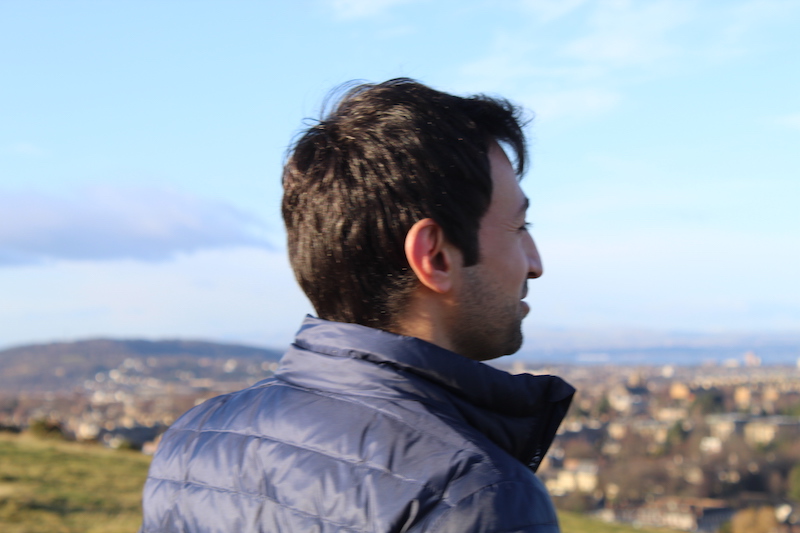
Tarek at Blackford Hill © Nikos
back home I was listening to completely different type of music that nobody really cares about here and it’s like here it’s a different language. It always takes some time to find the middle ground between who you are and who you become.”
I was very interested to hear more about that:
Sophia: Is there any cultural aspect that you can’t get used to?
Sophia: Do you feel like the UK has been a home to you?
To be honest, in the UK I have only been exposed to London, Edinburgh and a few other Scottish towns but Edinburgh specifically as a city it’s the place that changed my life. So I’ll always feel connected to the city first and then maybe to Scotland.
Edinburgh has been a home for Tarek, he feels connected to the city and even more connected than he now feels to the place he grew up in. His friends from UAE all ended up in different countries around the world and some of them even in the UK.
Although Tarek has never felt like he was not welcome in Edinburgh, I was curious to ask about what cultural differences were hard to navigate at first:
“everyone goes to pubs and drinks. I didn’t use to drink, not for any deep religious reasons, but it wasn’t my thing – I used to hang in coffee shops instead, and back home coffee shops stay open till 11 at night.” I deeply related to that: “here everything closes by 6 and socially this was a change. Or things like popular culture for example music
There is nothing as beatuiful as the shadows cast by gentle moving water.
Edinburgh has been a home for Tarek, he feels connected to the city and even more connected than he now feels to the place he grew up in.
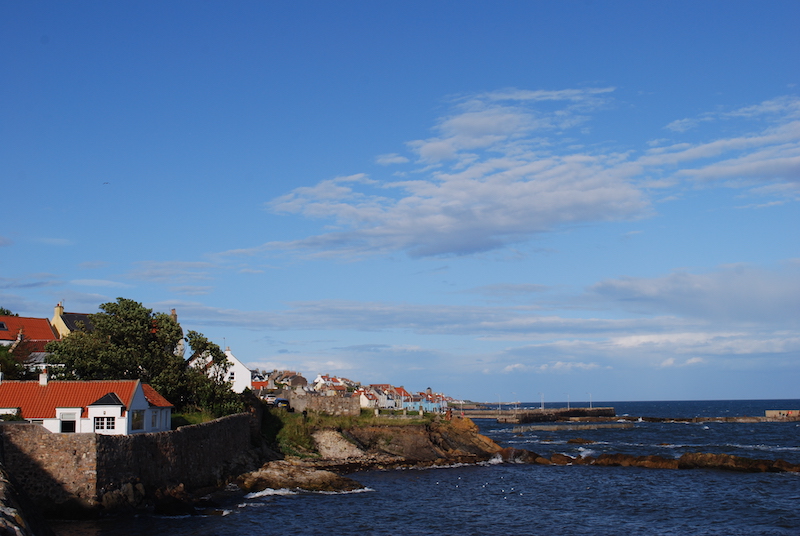
St. Monans © Waseem
03: RIAD
Waseem: Riad and I drove from Fife to St Andrews on a very sunny day. On the road, he introduced me to some alternative Arabic music which I have never heard before. We made a stop in Saint Monans which is Riad’s favourite place. It is a unique place, with views overlooking the North Sea and it is especially beautiful on sunny days like this one. We ended up in a pub in St. Andrews where Riad usually studies, got some beers and started the interview.
Riad was very familiar with the place and seemed to know many people after having lived in the town for some years. He was very enthusiastic to tell me about his experience living in the UK as a Syrian.
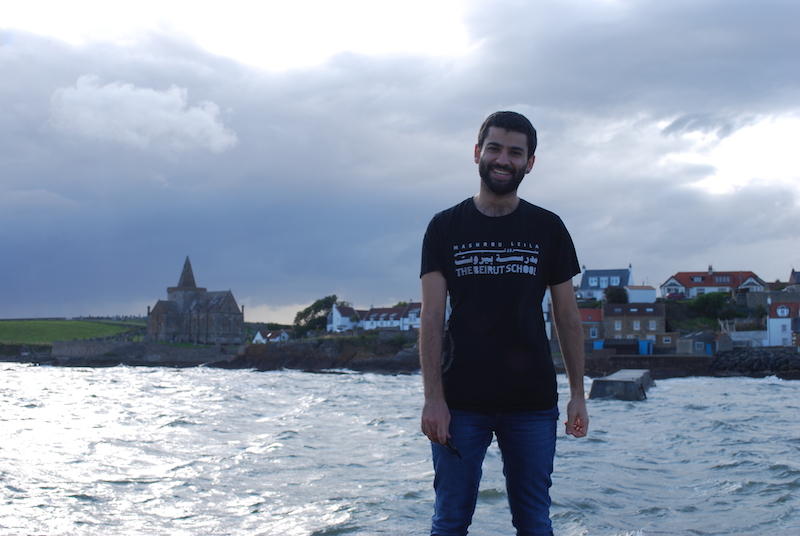
St Andrews
Now I live in St Andrews and I have finished the first half of my undergraduate degree in Medicine. I will continue in Manchester university and in 3 years I will be a doctor. I have been living here for 4 years. Before that I was in Tartus where I lived most of life. I left Syria in 2014.
Waseem Can you describe your home in Tartus?
I lived all my life in Syria in the same apartment. It was on the 4th floor and I was living with my family; my parents and my brother. We were living in a good and safe neighbourhood called “Al-Humrat”. My primary school was 3 blocks away. Nothing has drastically changed much since I left Life there is very different from my life here: I have changed 7-8 flats, the stability feels very different. The other difference is that I used to only live with my family in Syria while here, every year, people come and go in my flat. Basically, when you first move in with other people, it takes you awhile to get used to them and once you do, they move on.
It felt like I was always trying to prepare myself to settle in or leave. Everything seems transient.
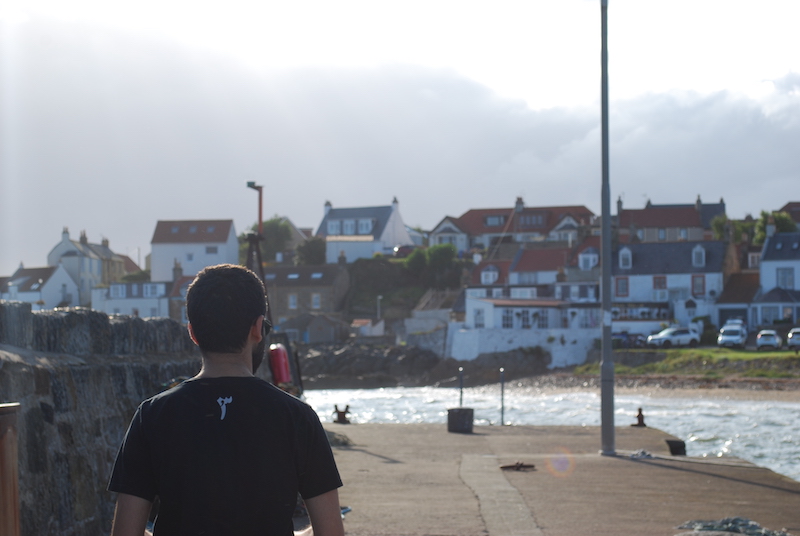
Riad walking in the pier of St Monans © Waseem
I like Saint Monans village because it reminds me of Tartus and it gives me a similar serenity and calmness. I grew up close to the sea and the sea is associated with home for me.
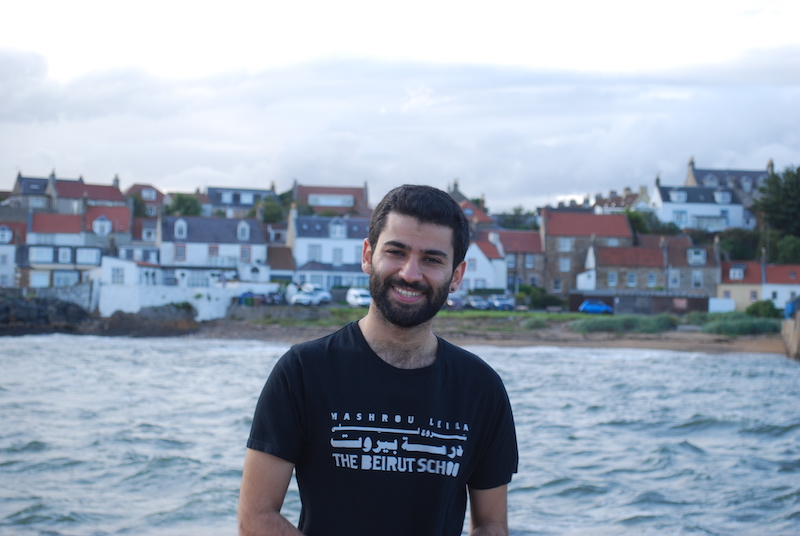
Riad © Waseem
Waseem: What are the difficulties that you normally face?
I feel privileged to have moved here directly after high school and to be able to start at a young age where you can still make friends. It is still hard to be away from home and build a house away from your family.
Sometimes I imagine what it would be like if I was studying in the same place where my parents live; they would visit me often and bring me stuff. I would talk to them about everyday problems and resolve them. It is not easy for somebody who is 18 to build a life on his own but being an undergrad and young gives you the flexibility to build friendships.
I was the only Syrian in the whole undergraduate community which was a bit difficult. When I talk about my country, there are some things that no one understands unless they have lived there. So I missed having somebody understanding what I mean and this has created a bit of a communication barrier with people.
For example, when I sometimes share stories from Syria during the war, people will get shocked and show a lot of sympathy and sometimes they will even cry. This is good in some aspects but in other aspects it reminds you that you are different. After that, you feel guilty that you shared the story.
Many times, I avoided sharing stories about where I come from in order to avoid this feeling of pity. It is very uncomfortable.
Waseem: Do you miss Syria?
Yes, a lot and especially at the beginning. Most of all, my family and close friends. I don’t miss Tartus as a city, but what I actually miss is the activities that I used to do there. I miss my school courtyard and how I used to escape from it with a group of friends. I miss my grandparents’ house in the countryside where we used to visit during weekends. What I miss is the people. I miss the route to Arwad Island.
here and I feel nostalgic about Tartus despite the differences in my lifestyle with the people living there. I miss the feelings rather than the place.
Aesthetically speaking, there is no comparison between St Andrews and Tartus; St Andrews is way better, but for me, there are places in Tartus that I used to see as the most beautiful places on earth.
I feel that I am like the people here, but not one of them. In Syria I felt that I was one of the people, but not like them.
Waseem: What is St. Andrews to you?
For me St. Andrews is linked with being posh and rich. A lot of people show off how fancy and rich they are. So the place is very upper class and it takes something out of the beauty of the city.
The other thing about St Andrews is that most people are students, so you don’t see many settled people living their lives normally and outside of academia. This place is very transient and there is nothing permanent. People tend to leave which is understandable. It feels like you are living in a big university campus. You live, work and study with university people.
Waseem: What are the things that you like about St Andrews?
Aesthetically the city is very nice, between the castle and the beach there are many nice stones to sit on and light bonfires. There are many nice beaches and green spaces around the city. I like the fact that houses are 2 or 3 stories high; this creates a feeling of calmness and does not cause anxiety like bigger cities often do.
When the weather is good (which is literally 4 times in a year), we go hiking or we go to the beach. People generally are friendly, especially the locals.
Waseem: How do you preserve your Syrian Identity while living away?
Riad: In St. Andrews there are no Syrians. If I want to see Syrian people, I go to Edinburgh or travel to Europe. I still call my family and my friends in Syria. I feel that I am still very Syrian; I always follow the news and compare my experience here to my experience in Syria. My father always sends me Arabic books and “Araq” from Tartus with people travelling to the UK; these bring me a lot of pleasure and keep me going for a while. I still listen to a lot of Arabic Music (Debkeh) and have gotten my St. Andrews friends into it as well.
I feel that I am like the people here, but not one of them. In Syria I felt that I was one of the people, but not like them. Since I was in high school, I was feeling as an outsider, my ideological and political ideas were different from those of others’. I feel that I belong with Syrian people though. I have been living in St. Andrews for 4 years now; I engage in the same activities as my friends who are also students, but I don’t feel that I belong. Although my lifestyle is similar to that of other people living in St. Andrews, I don’t think I will miss the place when I leave. I never felt that I belong here and I feel nostalgic about Tartus despite the differences in my lifestyle with the people.
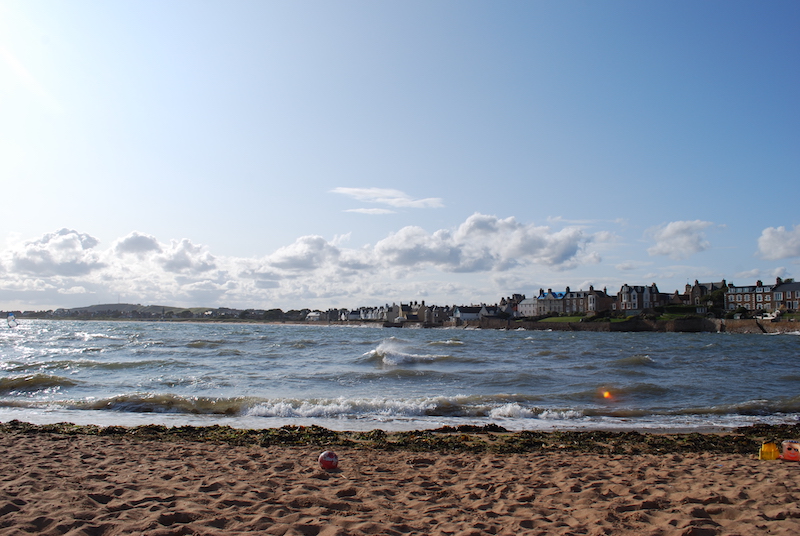
Seaside views in Forth © Waseem
Since I came here I had to deal with anxiety and depression. The hardest part was that I knew that I could not go back to Syria for the years to come; combine that with the pressure from the medical school. This caused me depression and due to that I was a year late in school. Christmas was particularly tricky. All my classmates would go home to spend the holidays with their families. When they ask ‘what are you doing for Christmas?’ I always remember that I cannot go back and this makes me feel different. For some time, I used to avoid talking about it to avoid the pity, but after a while I just accepted it and it was easier to deal with.
I was using the university support services, as well as the support from my friends in St. Andrews, especially those who are older than me and had issues with family themselves. Also, I learnt not to stress myself too much; this is something I learnt from medical school. Other things that helped me greatly are my Syrian friends in France and Germany who are going through similar difficulties. Seeing them was enough even if we don’t talk about the difficulties. I could see that they had similar issues and not being able to go home felt a bit more normal. In St. Andrews, I was the only Syrian and the only one who couldn’t go home.
Waseem: How do you think Syria and the UK will benefit from your experience? Syria?
I feel that I have a good insight into the Scottish life since I came to Scotland at a very young age, something that many of my fellow Syrian friends don’t have as they came here in their late 20s. Therefore, I feel well qualified in both Arabic and English to practice medicine and deal with Arab and English speaking patients. For example, I went to Greece several times to volunteer with humanitarian medical NGOs that help incoming refugees; there I used my knowledge and experience in Arabic and in English.
In St. Andrews, I was the only Syrian and the only one who couldn’t go home.
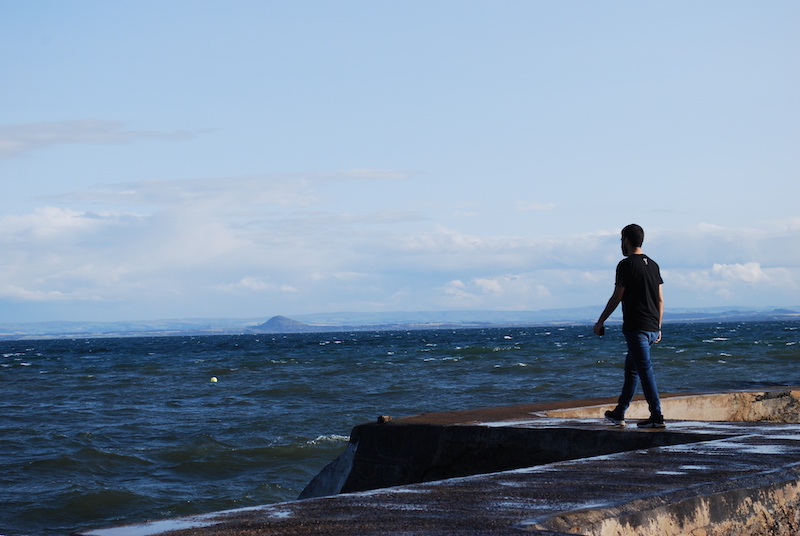
Riad walking in the pier of St Monans © Waseem
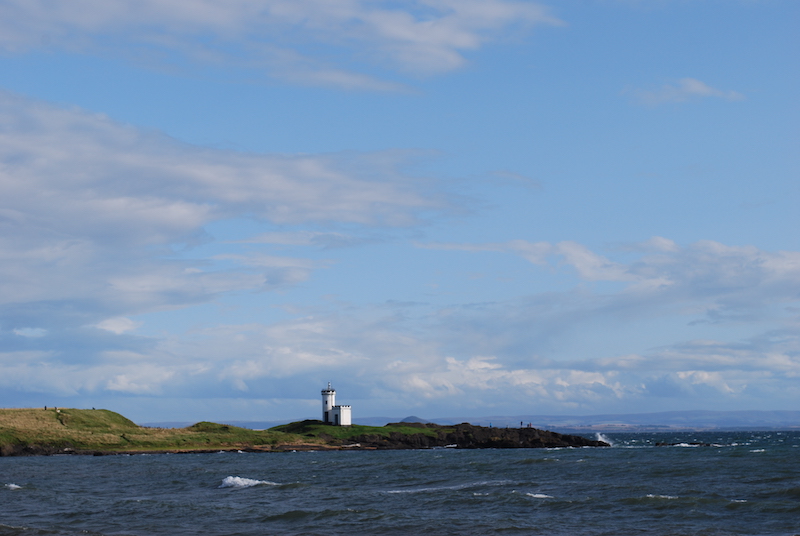
Seaside views in Forth © Waseem
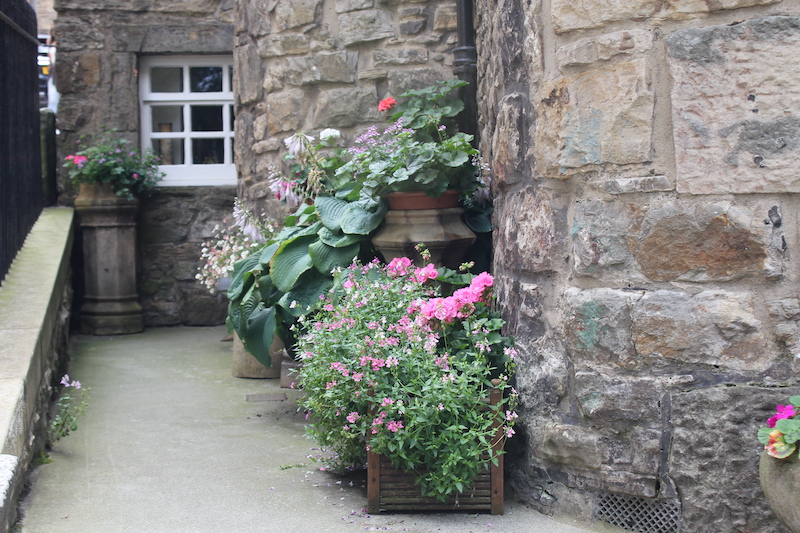
Dean’s Village, Edinburgh © Waseem
04: Lilac
Waseem: Lilac and I first met in a bar in central Edinburgh, where we were invited for a mutual friend’s birthday party. She was sitting right next to me and after we started chatting, I was impressed by her very good Scottish accent. Truth be told, I’m from Syria too, and I have been living in Scotland for 6 years, but I haven’t acquired such an accent. She shared her interest in doing research on Syrian identities for a postgraduate degree and we had a very interesting discussion about the concept of personal identity.
When I told her about this project, she agreed to take part in it, so we agreed to meet a few days later in a place that makes excellent coffee in Stockbridge. We ended up having one too many cups and by the end of the interview, we were very alert. Lilac was very keen to share her experience and to reflect on it, which made the chat more interesting.
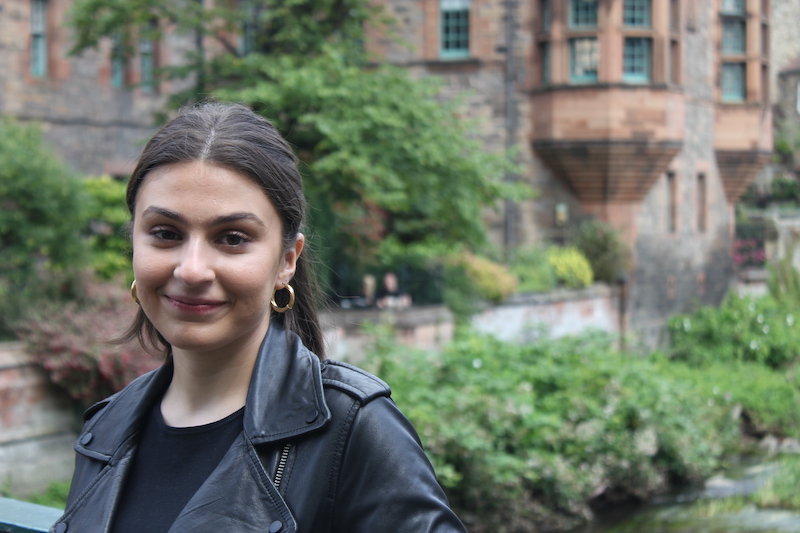
EDINBURGH
I was born in Abu-Dhabi and I grew up in Dubai. My parents were married in 1994 and then they moved to the UAE for work. We used to go to Syria every summer. My dad was working in Dier el Zour in an oil company, where my mom also used to work. My dad is a Christian and my mom is a Muslim. My dad converted in order to marry her; this was not an easy step but they wanted it to happen. I came to Edinburgh in 2014 to do an undergraduate degree in Law and now I am doing a master in International Relations of the Middle East.
Waseem: What was Syria for you?
It was very much focused on family, which was great. The downside was that there was no good internet but we had a good time there. It was very family-oriented. Of course, I don’t miss having to deal with the public sector – it’s very chaotic.
Waseem: What does Dubai mean to you?
To be honest, it means nothing apart from seeing my family and friends. Beyond that, it means nothing. I don’t think that I have ever liked living there and I didn’t fit in. I think you have to be a specific kind of person in order to enjoy it and I wasn’t that person. I always say this about Dubai: it can be a stop in people’s lives but they know that they cannot be there forever. It is temporary for everyone regardless of how many years you live there. It is really sad to say this about the place that I was raised in.

Lilac talking about the magic of Dean Village © Waseem
“Dean Village is a great place to escape in the centre of the city, especially during the festival season and it is hidden and calming. It brings me a lot of peace.” ~ Lilac
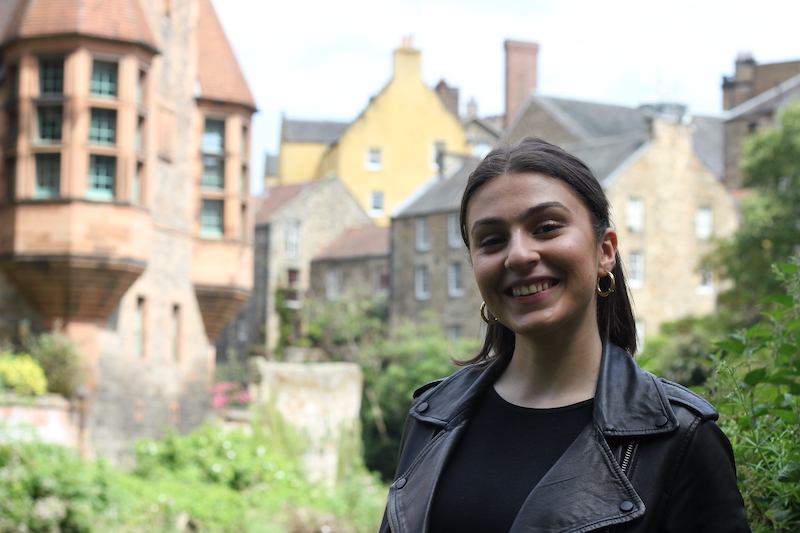 Lilac © Waseem
Lilac © Waseem
Waseem: What do you wish to see different?
I wish I could find more Arab friends, as I had to deal with the identity crisis. Having people who remind you where you come from, helps. I miss not being the minority. I don’t always feel strange but there are always little things that remind me about that.
On the bright side, I felt that I grew up much better here since I had to depend on myself. Personally, I feel more mature and I am grateful for the last 5 years.
Waseem: What do you do when it gets tough?
I go to therapy, and it has been very beneficial for me. When I talk I feel better. I also talk with some friends, get different perspectives and that makes me feel better.z
Waseem: Do you think your experience here could benefit the UK?
Certainly, having a Middle Eastern perspective and studying Scottish Law, I could provide a new point of view that could enrich the culture and society here.
Waseem: Do you think your experience here could benefit Syria?
Yes, I feel that my studies in law and international middle eastern relations could benefit my home country. I want to make a positive difference, but I still don’t know how, since I feel like I am not a typical Syrian.
That’s my mission and I feel that I have a duty to help my country. One day !
Having people who remind you where you come from, helps. I miss not being the minority. I don’t always feel strange but there are always little things that remind me about that.
Waseem: What do you miss about Syria?
I miss the extended family, the culture of food, everything, even the things that I hated at the time. For example, I miss the mess, the chaos, the horrible driving.
I regret that I haven’t seen much of Syria. I miss the lost opportunity to discover places there, especially because many places have been lost now. I wish I had the opportunity to see them before. I now have a vague memory of Syria, since I haven’t been there in 10 years. The more time I spend away from Syria, the more I appreciate the things that I miss.
When I first moved here, I used to just walk and explore different places and be impressed by the beauty of the city, from architecture to green spaces.
I like how pedestrian-friendly the city is; I like walking. I like that you can walk everywhere and th e city still takes my breath away. It is the most beautiful city I have ever been in.
Edinburgh is my home now, and what makes it home is the feeling.
Waseem: What are the difficulties that you find in living in the UK?
The culture is different. I am very much integrated but social interaction is still difficult for me. I didn’t realise that I have a problem with that until I was hit by personal relationships. I realised that I am not from here, I may have the accent, I may try to ignore the fact that I came from elsewhere, but I am not from here.
When I started to connect with people more, I started to see the differences more clearly and that was hard. As Arabs, we are very generous, honest and straightforward and for some people who are not used to that, they may see it as an opportunity to take advantage of you.
I feel that perception of certain gestures is different. I like everything about living here, except dealing with certain people on a deeper level. On a superficial level it is fine, and people respect your space.
Waseem: What is Edinburgh for you and what do you like about it?
Edinburgh is my home now, and what makes it home is the feeling. After I got over my homesickness (mostly I was missing my parents; I was 17 when I came here), I quickly felt part of the social fabric. What helped was that I was part of an international student team and we were all having the same shared experience.
It gave me a lot of freedom in contrast to Dubai where I felt very restricted. Here, I felt unapologetically myself. There is nothing that I hide from people here. Beyond that, I got independent after I moved. In Dubai, you get used to being dependent on others and everything seems easy. Here I had to depend on myself.
I learnt how to do that here and I love that. This is definitely one of the things that I am proud about myself. Edinburgh gave me that.
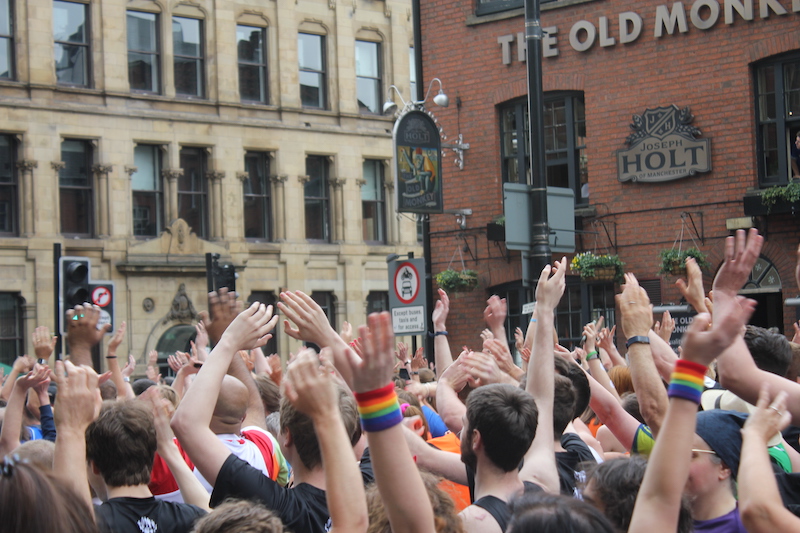
LGBT Pride March, Manchester © Waseem
05: Abed
Waseem: I met Abed at the Piccadilly Gardens in the centre of Manchester after a mutual friend brought us in contact . With this being the first interview, I was a bit nervous about how to handle the meeting and ask personal questions to somebody I haven’t met before. Abed turned out to be nice, friendly and very easy to talk to. We found a café right on the square and enjoyed the view.
Luckily, at the time, there was an African band playing near our table, which made the recording interesting and boosted our moods. It was amazing how quickly we got into deep conversation and started sharing our experiences. Abed was very keen and open to share his honest thoughts on the questions.
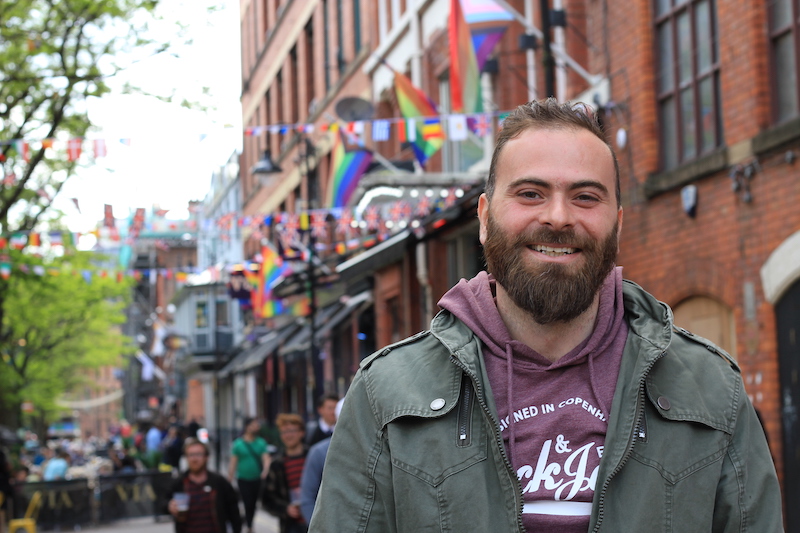
MANCHESTER
I came to the UK in 2016. Before that, I had applied to both Columbia and Washington universities and received a full scholarship to study clinical social work. Unfortunately, as with many visa claims for the United States, mine was declined.
Following that, I decided to move to the UK and applied for a master’s degree at the University of York. I studied post-war recovery and received a full scholarship. I hoped that this type of studies would equip me to meaningfully contribute to helping my country and the Syrian people recover after the end of the war. After finishing my studies, I moved to Manchester to look for a job; an experience that turned out to be a bit more difficult than I had expected.
I thought that it would not be too hard to find a job for somebody with my background and a Master’s degree. However, it was very difficult. All of the interviews were concluded with the interviewers saying ‘you did very well but you have no UK experience’. This was repeated over and over again.
At some point, I decided to do some volunteer work and volunteered in Revive NGO.
We were working with asylum seekers and refugees, specifically with people that had been refused asylum. I also applied for a job within this NGO but they told me that they couldn’t hire me, but they could offer me a board position.
I thought that this was very strange: how come I am qualified to advise as a board member but not qualified to work for them?!
It was very much focused
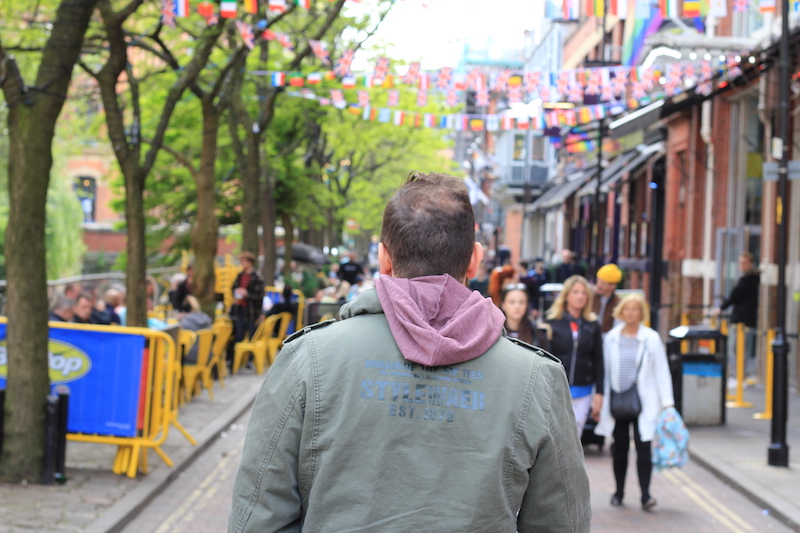
Canal Street, Manchester © Waseem
“The place that is special to me in Manchester is the Canal Street, which is known as the LGBT area. I like it because you could be free there and nobody cares about your background. “~ Abed
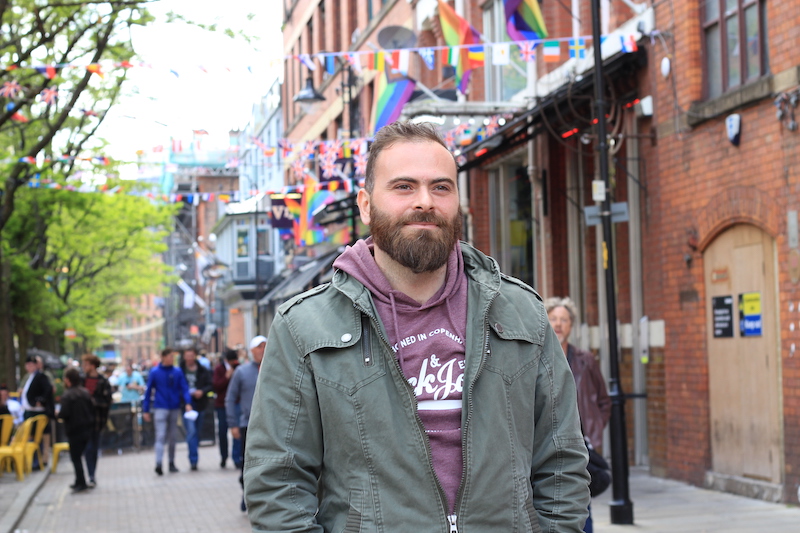
Abed © Waseem
I was raised to stay away from Muslims and realised how wrong that is when I was mature enough to understand the situation. We are all led by this sectarian racist ideology.
I like my house in Aleppo, but I don’t miss it. Although my house there was much bigger and more sophisticated than the one I currently live in, here I have freedom.
I have lost most of my friends from Aleppo because of different political and social views, which was sad. I have created new kinds of friendships in different parts of the world, though.
The thing that I miss most is the food of Aleppo and camping. I used to camp a lot in many places in Syria. This allowed me to get to know many Syrians from different backgrounds and cultures. I really miss the excitement of travelling there and meeting those people.
Waseem: What about Manchester, what do you like about it?
Manchester to me is a small London. I could not live in a place like London, it is very big and crowded. There is a lot of diversity here that we don’t see in Syria and this is a nice thing. On the other hand, you can see there is underlying discrimination and each community has its own neighbourhood but still very insignificant thing. On the other hand, you can see there is underlying discrimination and each community has its own neighbourhood but still very insignificant.
Waseem: Is there anything you wish to see different here?
Yes, I would like to see more integration between the Arabs and other communities here. Also, I wish there would be more efforts to tackle the social problem of “homelessness”. Many people live on the streets in inhumane conditions and it breaks my heart.
I would like to see more integration between the Arabs and other communities here. Also, I wish there would be more efforts to tackle the social problem of “homelessness”. Many people live on the streets in inhumane conditions and it breaks my heart.
Waseem: What did you find particularly frustrating about finding a job?
I applied for many jobs and realised that in some of them they had already made their mind on who to hire. At this one interview, one of the interviewers was looking at his phone while I was speaking. I believed that this was a good interview.
Later on I found out that somebody I knew was hired and he was informed of the position before it was publicly advertised. I didn’t get why they invited me for the interview in the first place. I guess they needed to do that in order to be legally covered. with the walls, I am now working with 35 displaced families. I like this job because I have direct contact with the families. What I currently do is conducting information sessions for Syrians.
The job is challenging but I like it; it is not easy to work with Syrians. Many have the notion that they want benefits money without working . My challenge is to convince them to change the lifestyle. My ultimate dream is to actually help these families. I am sitting down with them, asking them what they would like to do and then, together, we plan to make it happen. Then, what I do is to collect all information needed for them to reach their goal.
There is a lot of diversity here that we don’t see in Syria and this is a nice thing.
Abed’s home was in Western Aleppo and he was born into a Christian family. As Abed says, this part of Aleppo was not utterly destroyed like the eastern part.
Waseem: Tell me about your home in Aleppo? and what do you miss about it?
I can’t separate the political events from my memories in Syria. I know now that if I ever wanted to visit Aleppo, I would come across militia and radical people and I can’t stand that.
After the conflict started , the religious and social discrimination has been even more severe than before. Even people sharing the same religion are irritated by their neighbours because they may come from a poorer area. Personally, I can’t imagine myself living in this sickening situation. If you ask me what I remember from Aleppo, I don’t know how to respond.
After some time, I started working from home for an overseas NGO called Dawlati, I was the director. I liked the job and worked hard. Working from home was challenging though; I felt that I was working with the walls and I also had to follow the time-zone of the organisation. By the end, I couldn’t take it anymore and decided to resign. I was very frustrated and disappointed; it felt like I failed in that job and looking for a new job seemed really frustrating.
Finally, I saw an advertisement for a position with Kirklees Council related to refugees and integration. A friend of mine sent me the link. I told her that I was not going to apply but she pushed me into doing it. I prepared a lot for the interview and as it turned out they hired me.
I have been working there ever since. I have been very satisfied with my job and have the feeling that I am finally succeeding in what I do. You start to notice that you are making a change in the field. In contrast to working with the walls, I am now working with 35 displaced families. I like this job because I have direct contact with the families. What I currently do is conducting information sessions for Syrians.
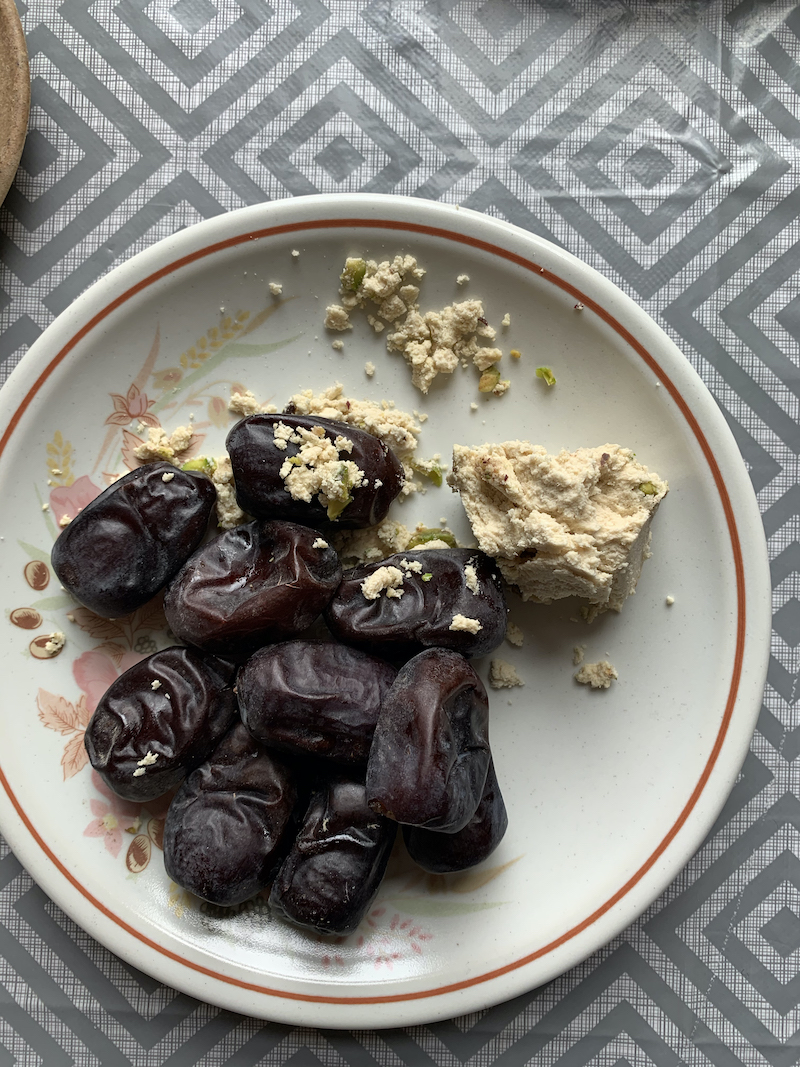
Nada: 06
GLASGOW
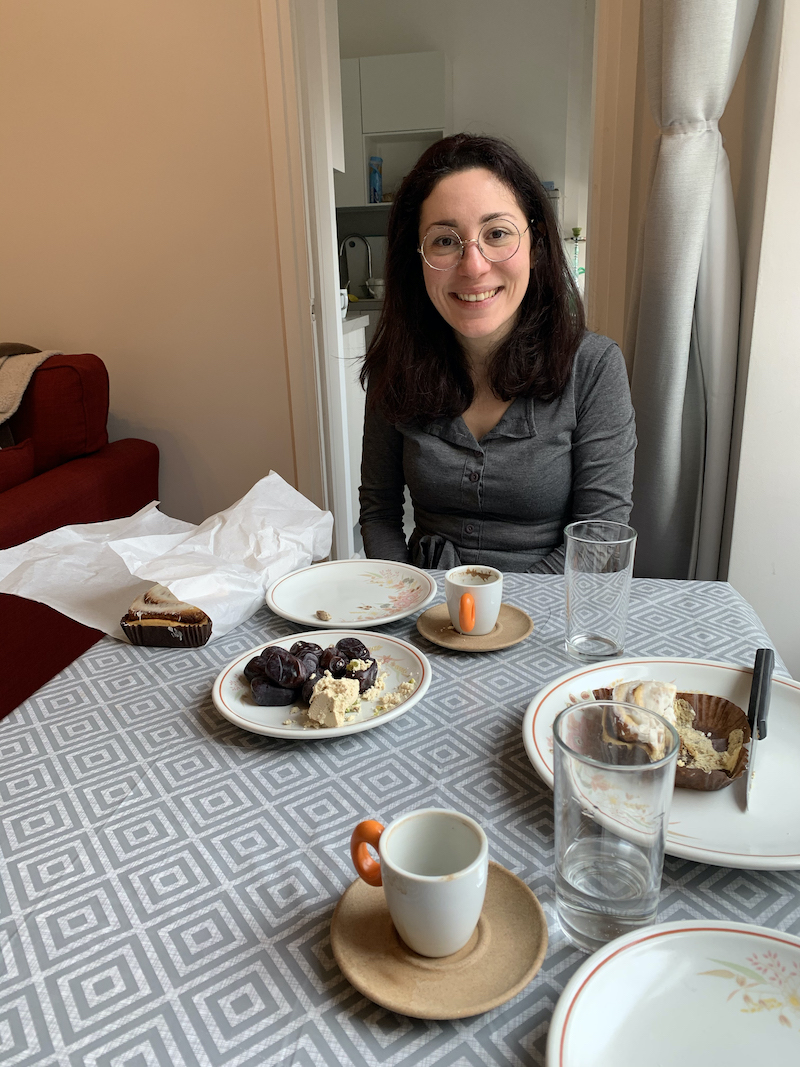
Nada lives in Glasgow and she was kind enough to invite me to her flat for the interview. The flat was very easy to locate since it is in the middle of Glasgow’s city centre. I had never met Nada before and did not want to visit her for the first time empty-handed, so despite being already late, I quickly found a Tesco’s to buy some cinnamon rolls for our coffee session. Little did I know that Nada had already prepared some Syrian delicacies for us to enjoy while having a chat.
We sat on a table by the window, had Syrian/Arabic coffee (a debatable issue indeed), dates and halva and although I did not know her, I felt strangely familiar with both Nada and the set up.
Nada moved to Scotland in 2013 to study for a master’s degree in St. Andrews University. She is originally from a Syrian city called Latakia right next to the Mediterranean sea. Nada grew up in Latakia and completed both an undergraduate and a master’s degree there before moving to Scotland:
“I did my BSc in Syria, I worked for about 3 and a half years and then I came because I wanted to change my career. I did engineering and wanted to do software development, so I applied for this Master’s in St Andrews and got accepted. I was also offered a scholarship, otherwise I would have ended up in France. My mother’s family are half French but only by passport. My aunts, uncles are there and now my grandparents live there, so it was the logical place to be.”
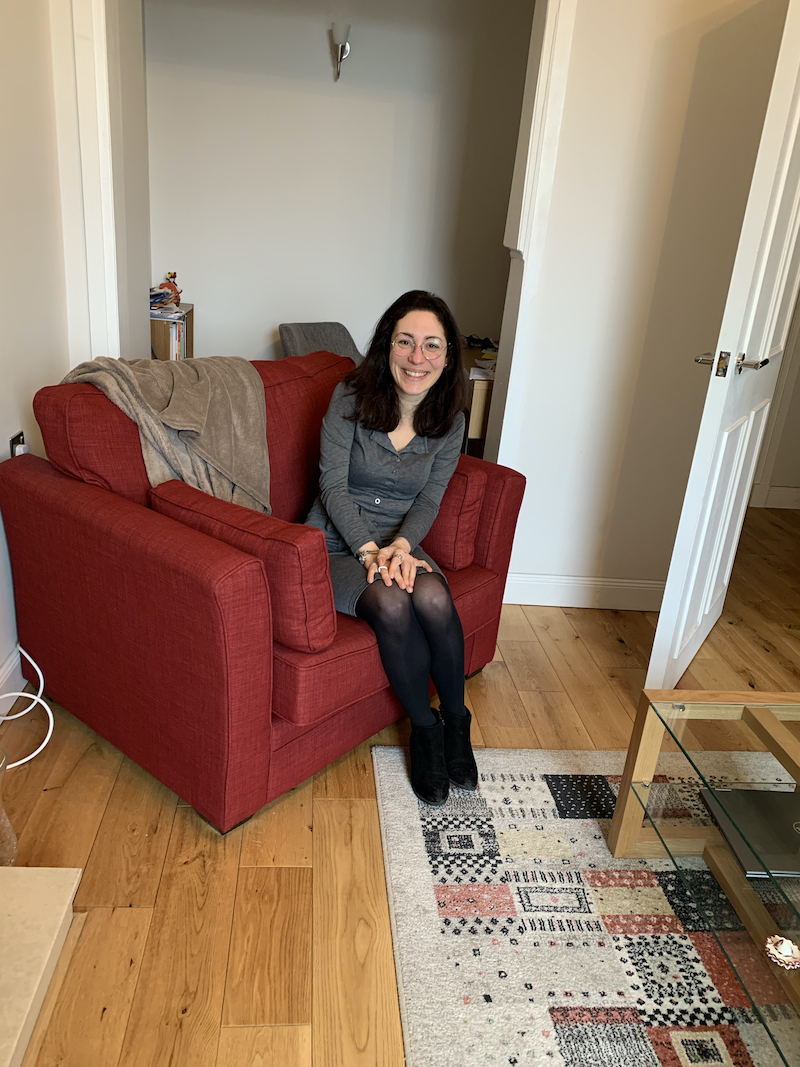
Nada in her House in Glasgow © Sophia
This family connection to France and the fact that Nada was already speaking the language and had an offer from Nant University made France an obvious choice. Nada said that one day and although her mind was set on France:
“a friend of mine said ‘have you checked this course? St. Andrews is a very good university and they offer scholarships for Syrians’ and I was like let me check and applied on the very last day”. To this day she still thinks she made the right choice.
I think I’ll never get used to the weather but apart from that, I love the city. My job is good, my teammates are nice, it’s an international company so there’s something going on almost every day, activities, cultural stuff and Glasgow is a vibrant city.
Sophia: Do you like it here?
Yes, I do! I think I’ll never get used to the weather but apart from that, I love the city. My job is good, my teammates are nice, it’s an international company so there’s something going on almost every day, activities, cultural stuff and Glasgow is a vibrant city. Sometimes I go to meetups to speak French, sometimes I go to speak Italian to keep the language going. I play tennis on average twice a week.
I do some charity work, like teaching people coding.
So yeah, I think it’s a very nice city for a foreigner, everybody is very open and very approachable and in every society or community that I tried to join, everybody is very welcoming. That’s a nice thing about Glasgow.
I did my BSc in Syria, I worked for about 3 and a half years and then I came because I wanted to change my career. I did engineering and wanted to do software development, so I applied for this Master’s in St Andrews and got accepted.
Sophia: How long have you been here in Glasgow?
4 years and 4 motnhs. I did my masters, 2014 I moved to Edinburgh and by July 2015 I had my job offer. I had to do a long training down in England though and I left my stuff with my partner in Edinburgh. I was physically between Barmouth and London I had training there and when I came back I moved officially to Glasgow by October, November 2015.
Sophia: Do you like it here?
I did my BSc in Syria, I worked for about 3 and a half years and then I came because I wanted to change my career. I did engineering and wanted to do software development, so I applied for this Master’s in St Andrews and got accepted.
Sophia: How long have you been here in Glasgow?
4 years and 4 motnhs. I did my masters, 2014 I moved to Edinburgh and by July 2015 I had my job offer. I had to do a long training down in England though and I left my stuff with my partner in Edinburgh. I was physically between Barmouth and London I had training there and when I came back I moved officially to Glasgow by October, November 2015.
are very direct you might make jokes that are sexists or about religion so I was wary not to do that when I came here. You assume that this wouldn’t be cool here but when I talked to people a bit more you realise that they do the same kind of jokes here, just like not on the first day they meet you.
Sophia: Do you think that the culture here could benefit from the Syrian culture?
Definitely, Syrians are warm people they would invite you at their homes on the second day they meet you so they balance a bit that people here are more closed and they would not invite you to their home after a few years they are knowing you because it feels very personal. I am not saying that this is wrong or right but the mixture is nice. Syrians are also hardworking people and the society in general would benefit from them, they have big families and bringing the young spirit could benefit the British society.
Sophia: Is there anything you’d like to add?
Another thing I would add and it’s different here than in Syria, is that back home if you don’t know people you are in trouble, you would not find someone to clean the windows.
Here, you also need connections but you can also find everything online, it might be more expensive or not the perfect service from the first time, but as a foreigner knowing nobody you can go to google and find zillions of options and compare and come do the job for you.
As many people that moved to the UK and elsewhere, you are never sure if this place will be your “forever” home, but that does not make it any less of a home. Nada met her husband in St. Andrews while he was doing his PhD. They moved to Edinburgh and then to Glasgow together. Nada has friends in Glasgow and takes part in a lot of activities. She says that:
“It definitely feels like home but it’s that we still don’t know if we are going to stay here long term. I would feel sad when I leave Glasgow and I try not to think that this the ultimate home so if we have to move out I won’t get very sad.”
Sophia: Do you miss Syria?
Yes, but when I visited, what I miss was not there anymore. What I miss is my friends who are now scattered, the town which was chill and calm and when I visited it was a very bad situation, you would hear the bombs all the time and people were very stressed. So this peaceful town by the Mediterranean was not there anymore. All of the people I know are not there and even the people I knew remotely are stressed and pessimistic.
Sophia: Do you feel you have a feeling of homeness here?
It’s difficult to say because I do feel like I’ m home; when I walk back from work I feel like I’m going home, when I go and visit family in France when I come back I do feel like I’m coming home, but if we were to leave Glasgow next year it would not be as difficult as me leaving Latakia.
Nada still experiences her Syrian identity here though. She speaks
Arabic with a few friends, goes to some Syrian restaurants, cooks Mediterranean food and hates butter. One thing she loves?
“I love British sweets though. I like my sweets to be very sweet so Scottish tablet is my type of sweet or even Christmas pudding”.
Sophia: Is there any cultural aspect that you find outside of your comfort zone?
I don’t think we have massive cultural differences I was wary not to . I mean in Greece you are kind of the same, you
There is nothing as beatuiful as the shadows cast by gentle moving water.
Syrians are hardworking people and the society in general would benefit from them, they have big families and bringing the young spirit could benefit the British society.
I was happy to hear that this simple question prompted such a positive and complete response. Nada seems like a very energetic and positive
person!
Sophia: Do you see a difference between Glasgow and St. Andrews ?
St. Andrews is like a fairy-tale place, it’s very tiny and half of the people [living there] are students. You can make friends within the first couple of weeks and you’ll end bumping in people all the time. So if you meet somebody you don’t have a chance to forget about them, you are going to meet them at Tesco’s, at the pub, the dancing society, the lab.
Nada is very happy that she had this experience but at the same time she does not think that she could live in St. Andrews for a long period of time. After all, she was raised in a big city and would definitely miss the noise.
enough motivation. Also last time the visit was not very pleasant; there was a battle close to the town and it was scary.”
Sophia: Do you feel settled here?
hen I first moved here it wasn’t easy because I grew up in a very safe environment. Studied in the same city I was born and raised, and worked there. Then I moved to St. Andrews which is not a measure because it’s like a bubble.When I moved here to Glasgow, my partner found a job down south after a couple of months and most of our friends from Edinburgh either remained in Edinburgh or moved to Canada or England so I felt on my own in a big city. Glasgow has some dodgy areas, you don’t understand everybody’s accents and also I moved in the beginning of November so the weather was bad every single day. I didn’t have lots of friends and did not know about the societies I could go and
As many people that moved to the UK and elsewhere, you are never sure if this place will be your “forever” home, but that does not make it any less of a home.
languages or other stuff. So the first six months were a bit rough but with the spring coming and the “sunshine” it was much better.
We are not sure we were going to settle here. But now we got a house and not planning to move anytime soon. It is still depending on the jobs though because the long distance relationship and [having] to travel every weekend and the stress with the trains and the delays is also hard.
That would be the only reason that I would move, not because I don’t feel like home here. But have we taken the decision that this is it? No, we haven’t yet.
I did my BSc in Syria, I worked for about 3 and a half years and then I came because I wanted to change my career. I did engineering and wanted to do software development, so I applied for this Master’s in St Andrews and got accepted.
Sophia: How long have you been here in Glasgow?
4 years and 4 motnhs. I did my masters, 2014 I moved to Edinburgh and by July 2015 I had my job offer. I had to do a long training down in England though and I left my stuff with my partner in Edinburgh. I was physically between Barmouth and London I had training there and when I came back I moved officially to Glasgow by October, November 2015.
Sophia: Do you like it here?
Nada’s family is now in France after a family petition they made. Her mother still travels back and forth to Latakia more than any other person in the family. As Nada says “It’s not the smoothest of travels on earth but she can manage.”
Sophia: Have you travelled back?
Just once, in 2014. Because I did a masters back home and what was left was the submission so I went back to submit and that was the only time. It’s not safe to travel and I understand people who go to see their families but for me, all my family is in France, my husband is Italian so I don’t have a strong.
Authors
Waseem Albahri
Sophia Simelitidou
Sophia holds a BSc in Theatre and Literature Studies and an MSc in Social and Cultural Anthropology. She has been in the UK for the last four and a half years and is currently managing a charity organisation that delivers after school sessions to children. Sophia has a particular interest in Syrian Identities, migration and LGBTI rights. By understanding and reflectively depicting the personal narratives and lived experiences of people, Sophia believes that meaningful inclusion can be achieved.
Supported by:
The Barakat Trust
The Barakat Trust supports the study and preservation of the heritage, architecture, archaeology, art and culture of the Islamic world by funding students, academic research, publications, digitisation, conservation, conferences and other projects.The Barakat Trust is an international non-political, non-religious, non-sectarian and independent charity based in the United Kingdom.
The Asfari Foundation
The Asfari Foundation is a British grant-making charity set up by Ayman and Sawsan Asfari in 2006. The Foundation focuses its efforts in the Levant and UK, with particular attention to the situation of the Syrian diaspora.Through its grant-making programmes, the Foundation invests in, and supports the sustainability of, a resilient and empowered civil society infrastructure and innovative youth, who can collectively lead a transformational positive change in their communities and countries.


